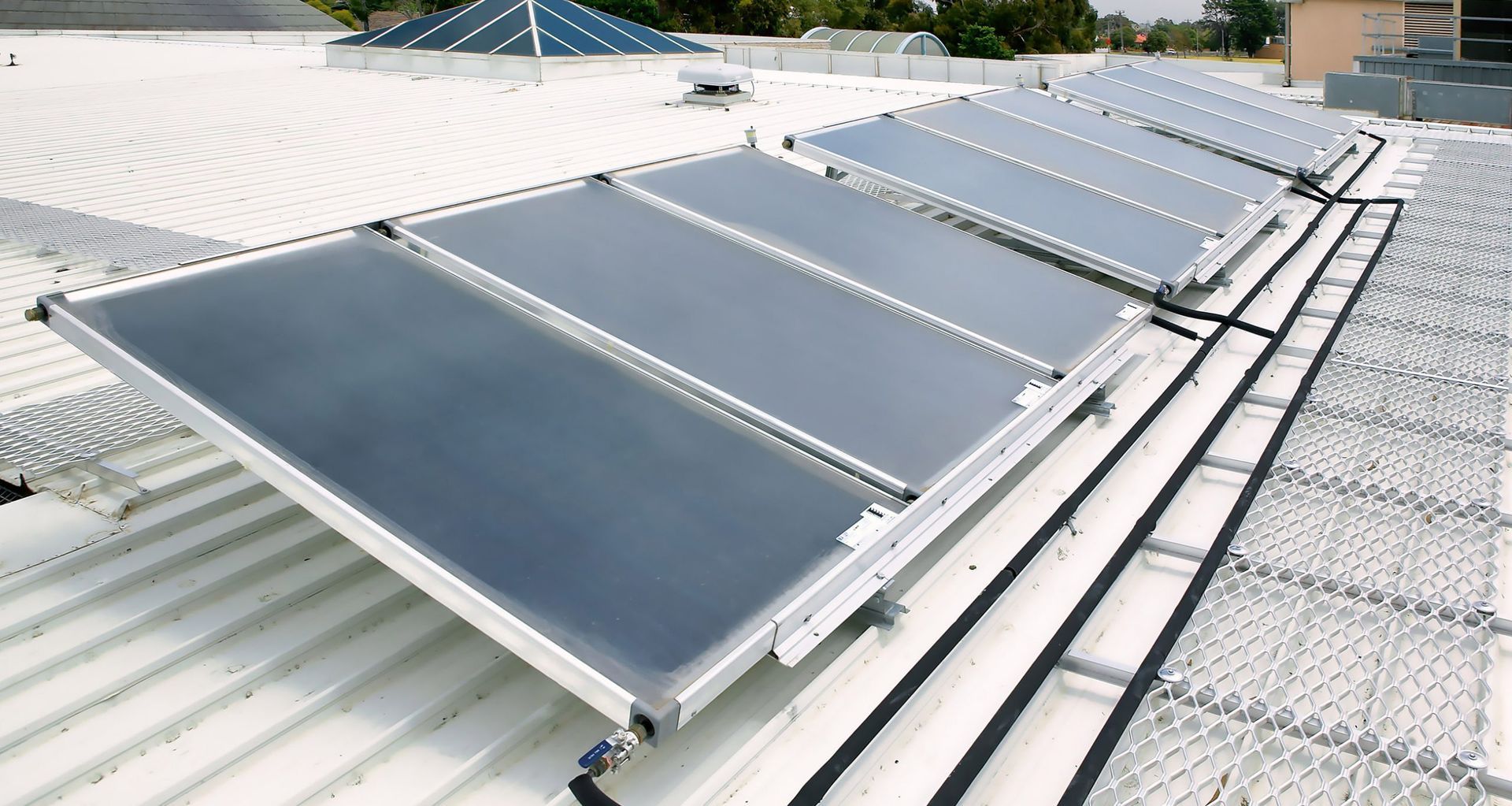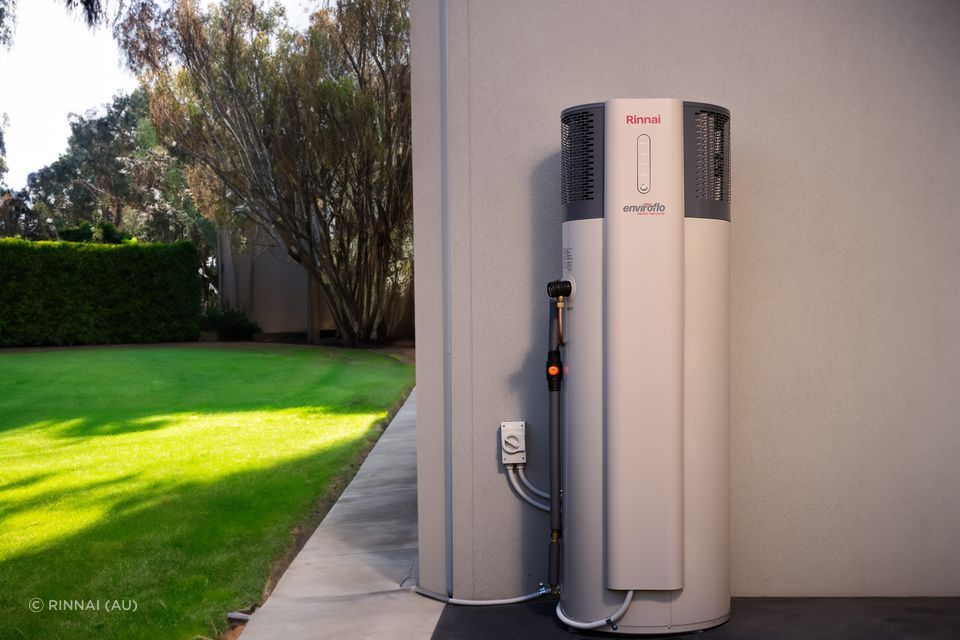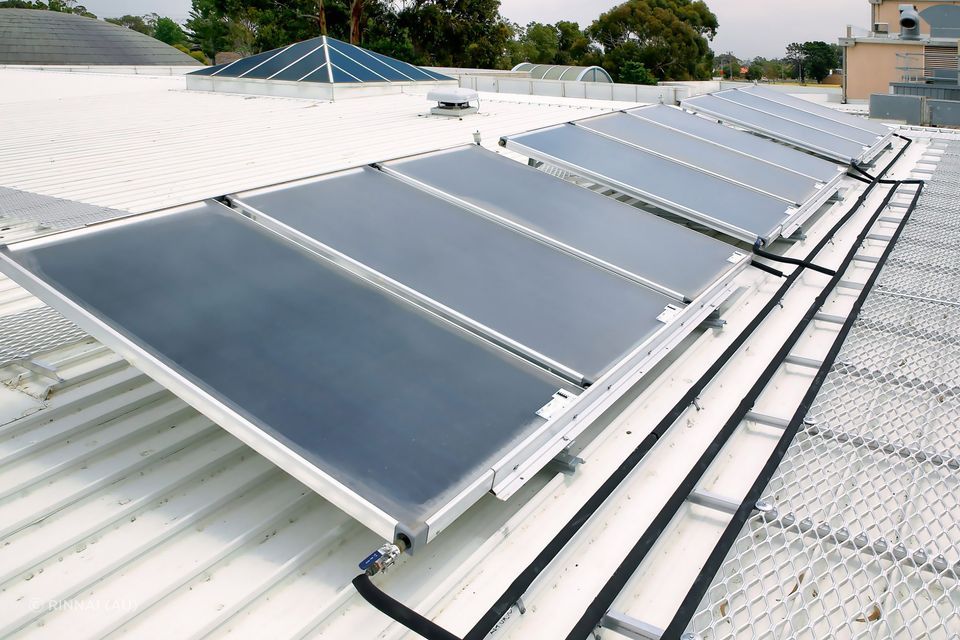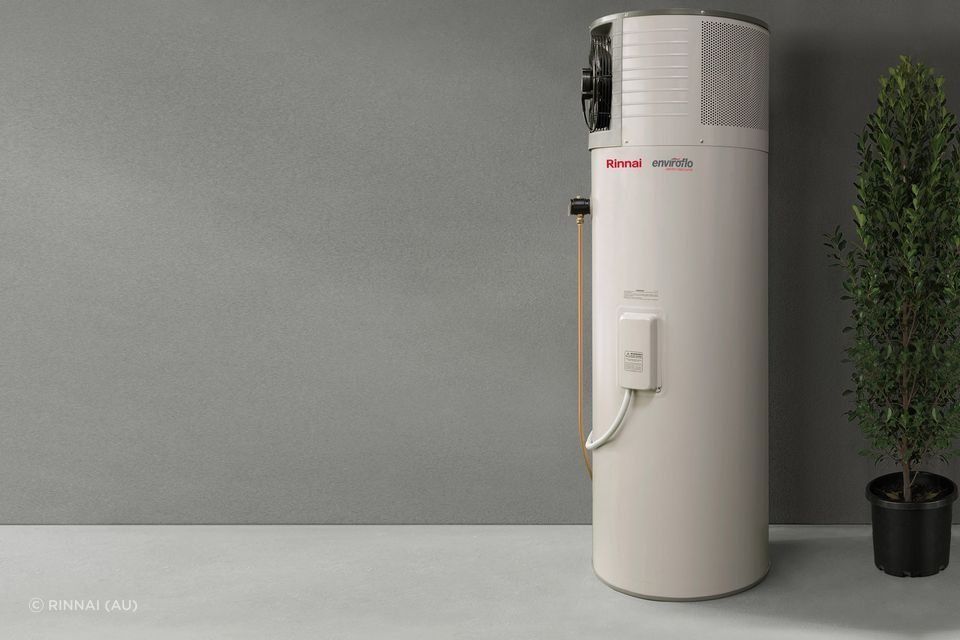Heat pump vs solar hot water: weighing technology against nature for home supremacy

Choosing your home's ideal hot water system involves more than just comparing features. It requires a thorough understanding of that as well as the installation processes, maintenance demands, overall costs and more. To make an informed decision, you must address all of these matters to determine which of these two excellent systems is best suited for your home.
What is a heat pump hot water system?
A heat pump hot water system efficiently heats water by transferring heat from the air, ground, or water into a storage tank. The system extracts heat from the surrounding environment using a refrigerant, compressing it to increase its temperature, and then transferring it to the water. This process has gained popularity for lowering utility bills and reducing environmental impact. With its ability to utilise renewable heat sources, a heat pump hot water system is a sustainable and cost-effective solution for domestic hot water needs.
Advantages
- Energy efficiency: Heat pumps are highly efficient, providing 3 to 4 times more heat per unit of electricity than traditional systems.
- Lower running costs: Their efficiency translates into significantly reduced energy bills compared to electric or gas water heaters.
- Environmental benefits: Heat pumps use renewable energy from the air or ground, reducing greenhouse gas emissions and lowering your carbon footprint.
Disadvantages
- Higher initial cost: Heat pump systems typically have a higher upfront cost than traditional water heaters, which can be a barrier for some homeowners.
- Performance in cold climates: Their efficiency can decrease in very cold temperatures, potentially requiring a backup heating system to maintain performance.
- Noise: Some heat pump units can be noisy, which might be a concern if installed close to living areas or bedrooms.
Pro-tip for choosing a heat pump
Energy efficiency: When buying a heat pump in Australia, prioritise energy efficiency and the right capacity for your home to lower long-term costs. Also, check for government rebates, like the Victorian Energy Upgrades (VEU) program, to reduce your upfront investment.
Average lifespan: 10 - 20 years

What is a solar hot water system?
A solar hot water system harnesses energy from the sun to heat water for domestic use. It typically consists of solar collectors installed on the roof, which absorb sunlight and convert it into heat. This heat is then transferred to a water storage tank, where the water is kept hot and ready for use. Solar hot water systems can significantly reduce reliance on conventional energy sources, lowering energy bills and decreasing carbon emissions. They are particularly effective in sunny climates and can be paired with a backup system to ensure a consistent hot water supply during cloudy or night-time periods.
Advantages
- Energy savings: Solar hot water systems can significantly reduce energy bills by using free, renewable solar energy to heat water.
- Environmental benefits: These systems reduce reliance on fossil fuels, lowering greenhouse gas emissions and contributing to a smaller carbon footprint.
- Low operating costs: Once installed, the ongoing operating costs are minimal, as sunlight is free and maintenance requirements are generally low.
Disadvantages
- High initial cost: The upfront cost of purchasing and installing a solar hot water system can be substantial, which may deter some homeowners.
- Weather dependency: The efficiency of solar hot water systems is highly dependent on sunlight, which can be inconsistent in cloudy or cold climates, which can result in a needed backup or boost system.
- Space requirements: Installing solar collectors requires sufficient roof space with good sun exposure, which might not be available in all homes.
Pro-tip for choosing a solar hot water system
Solar exposure: Evaluate your roof's orientation, angle, and shading to ensure it gets adequate sunlight. North-facing roofs with minimal shading are ideal. Consider using a solar assessment tool or consult a solar panel professional to gauge the system’s potential performance based on your location.
Average lifespan: 15 - 25 years

Maintenance requirements
Understanding the maintenance requirements is essential when choosing between a heat pump and a solar hot water system. Each system has its own set of tasks to ensure optimal performance, ranging from routine inspections to more technical upkeep. The frequency and complexity of these tasks can influence which system is more convenient for your lifestyle.
Heat pump
- Filter cleaning: Clean the air filter regularly, typically every few months, to ensure proper airflow and system efficiency.
- Checking refrigerant levels: Have a technician regularly check refrigerant levels to prevent leaks and ensure proper system operation.
- Inspecting the compressor: Conduct routine compressor inspections to catch signs of wear or performance issues.
- Condensate drain maintenance: Inspect and clean the condensate drain to prevent blockages and potential water damage.
- Outdoor unit maintenance: Keep the outdoor unit clear of debris and clean the coils periodically to maintain efficiency.
- General system checks: Regularly inspect the thermostat, electrical connections, and overall system performance to detect potential issues early.
Solar hot water heater
- Cleaning solar collectors: To maximise sunlight absorption, clean solar collectors regularly, especially in dusty or polluted areas.
- Checking the glycol or heat transfer fluid: To maintain system efficiency, periodically check and top up or replace the fluid.
- Inspecting the system for leaks: Regularly inspect the plumbing, valves, and connections for leaks to prevent efficiency loss and damage.
- System flushing: Flush the storage tank periodically to remove sediment and prevent scaling.
- Backup heater maintenance: Maintain the backup heater by checking for proper operation and efficiency during cloudy days.
- Monitoring performance: Regularly review system performance data to ensure efficient operation and identify maintenance needs.
Verdict: A heat pump is ideal for regular, straightforward upkeep. However, if you'd rather have less frequent maintenance, though potentially more technical repairs, a solar hot water system is the better fit.
Comparing the costs
Cost is often a determining factor when comparing heat pumps and solar hot water systems. Both systems offer distinct financial implications, from initial purchase and installation costs to long-term operating expenses. Whether you’re prioritising lower upfront costs or aiming for long-term savings, knowing the cost between the two will help you make an informed decision that caters to your financial goals.
Heat pump
Unit price: Between $2,000 to $6,000
Installation cost: Installing a heat pump water heater often requires two trades: plumbing and electrical work. With that in mind, the cost ranges between $600 and $1,400+.
Operating cost: A heat pump costs around $600 - $700 per year for a four-person household with regular usage patterns.
Solar hot water system
Unit price: Between $3,500 to $7,000
Installation cost: Like most installations, the cost will vary depending on different factors like system type, size, booster, region, roof type and so on. However, you can expect to pay around $2,500 to $6,000+.
Operating cost: The annual operating cost will vary based on climate and how much your booster will need to be used, but you can expect to pay about $400 - $500 per year for a four-person household with regular usage patterns.
Verdict: For minimal upfront costs, a heat pump provides more options, which are complemented by reasonable operating costs. However, solar hot water systems provide longer-term savings, especially in sunnier regions. For the most accurate cost estimates, it always pays to ask the supplier/provider of the product as they'll know the exact specifications for the models in question.
Which is easier to install?
When considering the installation of heat pumps versus solar hot water systems, the complexity of the process can vary widely depending on the type of system and the specific conditions of your home. Factors such as the existing infrastructure, site conditions, and the need for modifications all play a significant role in determining the ease of installation.
Heat pump
Types: Air-source, ground-source (geothermal), and water-source heat pumps.
Installation complexity:
- Air-source heat pumps are generally straightforward, especially in homes with existing ductwork. The outdoor unit must be placed on a stable surface, and electrical connections must be made. Modifications to ductwork or plumbing might be needed.
- Ground-source (geothermal) heat pumps are significantly more complex because the underground loop system must be installed using extensive ground excavation. This may involve drilling or trenching, which requires heavy machinery and careful planning.
- Water-source heat pumps: Installation involves a water source, like a lake or well, and can be complex if the water source isn't readily available or needs modification.
Solar hot water system
Types: Active systems (with pumps) and passive systems (without pumps).
Installation complexity:
- Solar collectors: Must be mounted on the roof, ideally facing north, which may require structural assessments and reinforcements. The collectors must be connected to the hot water storage tank via insulated piping, which might involve running pipes through the building.
- Plumbing and electrical work: Requires integrating the system with the existing plumbing and potentially installing a pump, controller, and expansion tank. Roof penetrations for piping must be properly sealed to prevent leaks.
- System integration: Ensuring compatibility with the existing heating system can be complex, especially if retrofitting an older home.
Verdict: In terms of heat pumps, air-source heat pumps will be the easiest to install; however, solar hot water systems are next in line, with water and ground-source heat pumps trailing behind.

Rebates and discounts for your hot water heating
When considering installing a heat pump or solar hot water system, rebates and incentives can be crucial in reducing the upfront costs, making these energy-efficient systems more affordable. In Australia, several federal and state-level programs offer financial incentives to encourage the adoption of renewable energy technologies.
Small-scale technology certificates (STCs)
Administered by the Clean Energy Regulator, Small-scale Technology Certificates can be claimed when installing an eligible heat pump system. The number of STCs you receive depends on the size of the system and your location, which can then be traded or sold, effectively reducing the installation cost.
State-based rebates
Australian states offer various incentives for renewable energy systems. Victoria's Energy Upgrades (VEU) program provides discounts on heat pump installations, while Queensland’s Solar for Rental Properties Rebate encourages landlords to install solar hot water systems.
How to apply
To benefit from these rebates, it’s essential to:
- Check eligibility: Ensure the system you're purchasing is eligible under the specific rebate program. Each program has criteria, including system efficiency, installation location, and installer accreditation.
- Work with accredited installers: Rebates often require installation by a professional accredited by the Clean Energy Council or a similar body. Accredited installers ensure compliance with rebate requirements and safety standards.
- Submit necessary documentation: After installation, submit the required documentation, such as proof of purchase, installation certificates, and any other forms specific to the rebate program. This is crucial for claiming your rebate or STCs.
By leveraging these rebates and incentives, you can reduce the upfront cost of installing a heat pump or solar hot water system, making the transition to renewable energy more affordable and attractive for your home.
Which one to choose for your home?
When deciding between a heat pump and a solar hot water system for your home, several key factors must be considered: budget, climate, available space, and environmental priorities. Each system offers distinct advantages depending on your specific needs and circumstances. Here's how to determine which option best fits your home and lifestyle.
A heat pump is best for you if you want:
- Consistent performance: Ideal for regions with varying climates, providing reliable hot water even in colder weather.
- Lower initial costs: Offers a more affordable upfront investment than solar systems, making it accessible for more homeowners.
- Energy efficiency: Highly efficient, reducing energy bills significantly over time.
- Installation flexibility: Can be installed in various locations with less dependence on roof orientation and sunlight.
- Reduced maintenance needs: Requires regular but simple maintenance tasks like filter cleaning and system checks.
A solar hot water system is best for you if you want:
- Long-term savings: Offers substantial reductions in energy bills over time, especially in sunny regions.
- Environmental impact: Minimises carbon footprint by using renewable solar energy.
- Low operating costs: Once installed, the system's cost is minimal, as it uses free energy from the sun.
- Durability: Typically has a longer lifespan, offering more years of service with less frequent replacement.
- Less frequent maintenance: Requires less routine maintenance, though the tasks might be more technical.
Summary
Ultimately, deciding between a heat pump and a solar hot water system comes down to your circumstances. Heat pumps offer greater flexibility and consistent performance across various climates, with lower upfront costs. Solar hot water systems provide significant long-term savings and environmental benefits in sunny regions but require a larger initial investment. By evaluating your home’s needs, climate, and budget, you can choose the system that best meets your hot water requirements while aligning with your sustainability goals.
Related article: Comparing hot water heating systems: what’s best for Australian homes?
